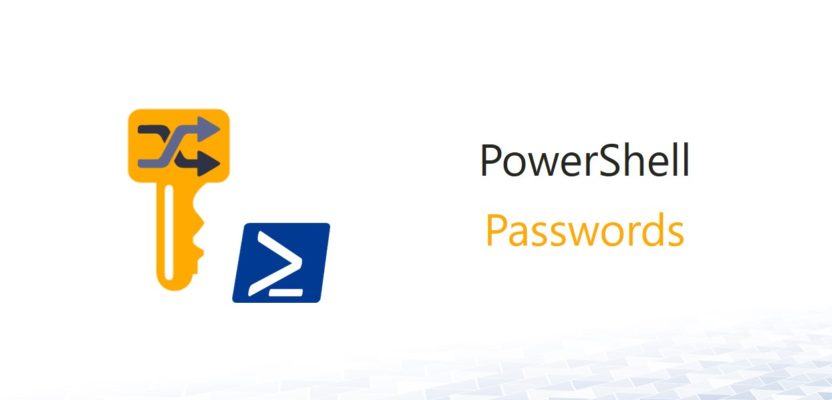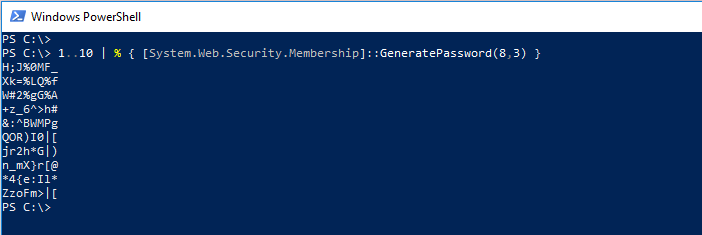
- Powershell random password generator install#
- Powershell random password generator generator#
- Powershell random password generator update#
- Powershell random password generator full#
- Powershell random password generator password#
$PasswordLength = Get-Random -InputObject ($MinimumPasswordLength.$MaximumPasswordLength)
Powershell random password generator full#
Here is the full script: Function GeneratePassword Get-Random -Count $PasswordLength) -replace ' ') $Password = (($AllowedPasswordCharacters | The answer to your question about always including a number in your generated output can be solved by checking the output with a regex match (just use the parts of the regex that you need, based on the explanations above), the example here checks for uppercase, lowercase, and numerical: $Regex = "(?=.*\d)(?=.*)(?=.*)" (?=.*\W) must contain at least one non-word character For example if you type: char35, it should return a hash sign.
Powershell random password generator password#
This is accomplished within Powershell by typing char SomeNumber. Method 1 It’s quite easy to pipe a bunch of chars to Get-Random to get a somewhat random password like this: Using the operator -join will join the array back to a string with an empty string between each element.
Powershell random password generator generator#
(?=.*) must contain at least one uppercase character How The Random Password Generator Powershell Script Works Essentially what this script does is take a number and pass it as a character data type. (?=.*) must contain at least one lowercase character

(?=.*\d) must contain at least one numerical character
Afterwards the book can be generated with New-PowerShellBookPowershell random password generator update#
So if there is not much to see in the calls above or in the generated books, an update help should be called first.First the module has to be. It also allows an easy to edit character set, and also has a regex to ensure a decent password has been generated with all of the following characteristics: The PowerShell command for this is: Update-Help. (To hard set a password length, just set the MinimumPasswordLength and MaximumPasswordLength values to the the same length.) The difference in this script is that the password length can also be randomised. Similar to the accepted answer, this script also uses Get-Random (twice), and also regular expression matching to ensure the output is secure. I wrote a secure password generator function in PowerShell, maybe this will be useful to someone. I'm fully aware that there are several of those out there, so there's nothing new under the sun, what I did add though, was the option to return the passwords in. $pass = (($pass.GetEnumerator() | Get-Random -Count $pass.Length) -join '') I often need to create random passwords on the fly, and I always have a PowerShell prompt open, so since I had some time on my hand, I decided to write a small password generator. $pass += ($set.GetEnumerator() | Get-Random) Is there possible to write the password and the username to a csv file and the csv file have not be overwritten, if I run the script several time. \Get-RandomPassword.ps1 -Characters ($sets -join '') But how can I know or see the generated password I want to deploy to 100 different machines and it created 100 new users. I had one of the requirement to write Strong Random Password Generator :Microsoft Powershell earlier but it was completely command line based, and the applications users who were using it, due to non-technical background were not able to execute it correctly, So the team who requested the script wanted it in GUI form (Graphical user Interface. That's why I reinvented the wheel: Function Create-String($Size = 8, ]$CharSets = "ULNS", ]$Exclude) :''",/?`~') Yes, hexadecimal strings are all lower-case… All you need now is a way to remember these generated strings and passwords… -)īonus: Use PowerShell to create a random password: 1.As suggested by jisaak, there is no 100% guaranty that the Membership.GeneratePassword Method generates a password that meets the AD complexity requirements. In PHP you can use openssl_random_pseudo_bytes(), with bin2hex() for readability: If you have installed OpenSSL on Windows, you can use the same openssl command on Windows to generate a pseudo-random password or string: c:\Users\Jan>C:\OpenSSL-Win64\bin\openssl.exe rand -hex 8ģ3247ca41c60ac53 PHP OpenSSL – create a pseudo-random password with PHP and OpenSSL Generate random passwords in Windows using OpenSSL Or an 8 byte random string, base64 encoded output: $ openssl rand -base64 8
Powershell random password generator install#
Install Module Azure Automation Manual Download Copy and Paste the following command to install this package using PowerShellGet More Info.

You only have to decide the byte-length of your password or string, and OpenSSL does all the calculations.įor example an 8 byte pseudo-random string, hex encoded output: $ openssl rand -hex 8 Generate random passwords with the constraints you want. The rand command outputs num pseudo-random bytes after seeding the random number generator once. The OpenSSL rand command can be used to create random passwords for system accounts, services or online accounts.

1.2 PHP OpenSSL – create a pseudo-random password with PHP and OpenSSL Pseudo-random passwords and strings with OpenSSL


 0 kommentar(er)
0 kommentar(er)
